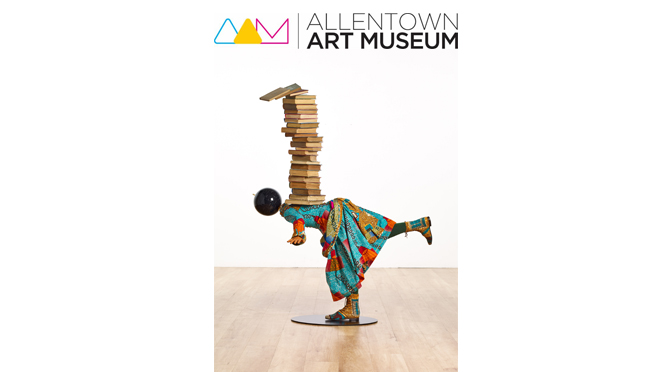Featured Image: Yinka Shonibare MBE (British, born 1962), Girl Balancing Knowledge III, 2017, fiberglass mannequin, Dutch wax printed cotton textile, books, globe, leather, steel baseplate. Allentown Art Museum, purchase: Priscilla Payne Hurd Endowment Fund, 2018
British-Nigerian Artist Yinka Shonibare Presents Commissioned Sculpture to Allentown Art Museum
Allentown, PA – The Allentown Art Museum is one of two destinations in the U.S. where internationally-acclaimed artist Yinka Shonibare MBE will speak in March. On Saturday, March 10, 2018, Shonibare will discuss his work upon the unveiling of his new sculpture Girl Balancing Knowledge III that was commissioned by the Allentown Art Museum. The sculpture will be on temporary view the weekend of March 10-11, and the Museum will stay open until 7pm on Saturday, March 10, following Shonibare’s presentation, which begins at 3pm. Admission to Shonibare’s presentation is free with Museum admission and pre-registration.
The sculpture will be on view in Trexler Gallery on Saturday, March 10, and Sunday, March 11. This is a unique opportunity to see the new commission ahead of the planned reinstallation of the Museum’s permanent collection which is expected to be completed in 2019. Purchase of the sculpture was made possible by the Priscilla Payne Hurd Endowment Fund.
About the Sculpture
In a series of sculptures entitled Balancing Knowledge, Yinka Shonibare addresses questions of identity in a complex, globalized society.
This seminal acquisition is key for the Museum’s goal to engage the public with art that highlights varied cultural narratives and sparks discussion about contemporary issues like race and identity, issues that are compelling and thought-provoking. In this series, Shonibare’s sculptures feature life-size child mannequins carrying teetering piles of books. Their dynamic poses suggest the challenges of obtaining an education, but also evoke energetic play and childish joy in learning and discovery. Each fiberglass mannequin has a globe for a head, a choice that Shonibare commonly makes in his work, which lends itself to varying interpretations: a reference to globalization, a thirst for all-encompassing knowledge, or a way to avoid any racial markers of identity.
Information and image provided to TVL by:
Angela Zanelli
VP Development and Communications
Allentown Art Museum






